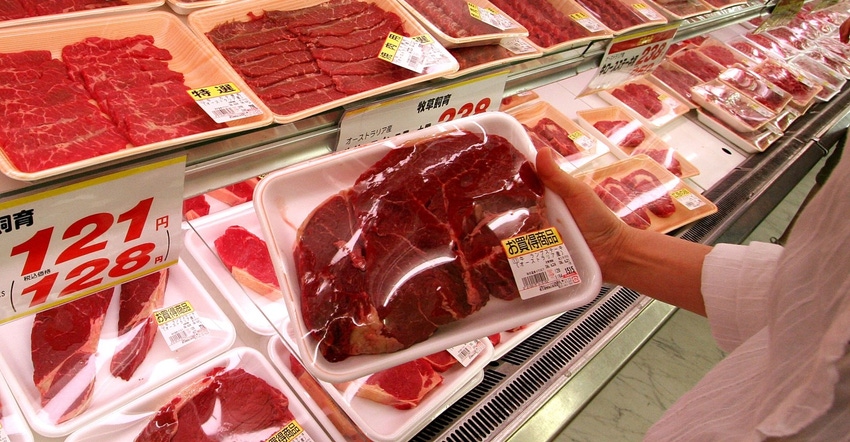
The United States and Japan have reached an agreement to increase the beef safeguard trigger level under the U.S.-Japan Trade Agreement. The new three-trigger safeguard mechanism will allow U.S. exporters to meet Japan’s growing demand for high-quality beef and reduce the probability that Japan will impose higher tariffs in the future, according to a release from USDA and the U.S. Trade Representative’s office.
U.S. beef exports to Japan exceeded 320,000 metric tons in 2021 and set a new value record at $2.38 billion. But U.S. beef was subject to a higher tariff than its competitors for 30 days, from mid-March to mid-April, after imports exceeded the safeguard volume. As part of the terms of the Japan – U.S. Trade Agreement, both countries entered consultations after the volume-based safeguard was triggered in March 2021.
“This is a positive development for America’s farmers and ranchers. It allows for greater market-based growth in U.S. beef exports to Japan and reduces the probability of higher Japanese tariffs being imposed on U.S. goods,” says Agriculture Secretary Tom Vilsack. “America’s farmers and ranchers have beef products that can compete anywhere in the globe and this announcement will allow them to demonstrate just that.”
The latest adjustment to the original agreement includes a new three-trigger mechanism whereby all three triggers must be hit in order for Japan to implement the safeguard and impose a higher tariff. The three triggers are:
Imports from the United States must exceed the original beef safeguard trigger level under the U.S.-Japan Trade Agreement;
The aggregate volume of beef imports from the United States and the original signatories of the Comprehensive and Progressive Agreement for Trans-Pacific Partnership (CPTPP) must exceed the CPTPP beef safeguard; and
Imports from the United States must exceed the total amount of beef imports from the United States during the previous year.
Both governments will work to finalize the text of the agreement reflecting the new trigger levels and complete their respective domestic procedures. The United States, in consultation with Japan, will publish the final text of the agreement at the soonest, appropriate time, USTR says.
“This agreement is a great win for our two countries that ensures American farmers and ranchers can continue to meet Japan’s growing demand for high-quality U.S. beef,” says USTR Ambassador Katherine Tai. “I especially want to thank Ambassador Rahm Emanuel for his fierce determination to get this deal done.”
United States Ambassador to Japan Emanuel says this is a “win-win” for American ranchers and Japanese consumers. “It ensures certainty for years and shows American beef can compete and win anywhere anytime,” he adds.
Beef industry welcomes agreement
The National Cattlemen’s Beef Association and U.S. Meat Export Federation welcomed the adjustment to Japan’s beef safeguard.
USMEF President and CEO Dan Halstrom says, “The U.S.-Japan Trade Agreement was a tremendous breakthrough for the U.S. meat industry, including the significant reduction in Japan's tariffs on U.S. beef, but the playing field has not been entirely level due to this safeguard. The changes announced today reduce the potential impact of the safeguard and make it less disruptive for U.S. exporters and their customers in Japan."
“While the details of the agreement in principle have not been disclosed, NCBA is encouraged that today’s announcement means we are taking necessary steps to secure long-term solutions that enable American cattle producers to continue providing Japanese consumers with high-quality U.S. beef at competitive prices. NCBA greatly appreciates Ambassador Tai’s leadership and the hard work of negotiators who have been working on this effort for the past year,” says Kent Bacus, NCBA senior director of international trade and market access.
About the Author(s)
You May Also Like






